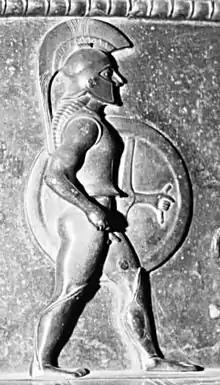Hippocoon of Sparta
In Greek mythology, Hippocoön (/hɪˈpɒkoʊˌɒn, -kəˌwɒn/; Ancient Greek: Ἱπποκόων) was a Spartan king.
Family
Hippocoon was the son of the Spartan King Oebalus and Bateia. His brothers (or half-brothers) were Tyndareus and Icarius.[1][2] Names of Hippocoön's sons include Lycon, Alcinous, Dorycleus, Scaeus, Enarophorus, Eurytus, Bucolus, Euteiches, Lycaethus, Hippothous, Tebrus, Hippocorystes,[3] Alcimus, Dorceus, Sebrus, Eumedes,[4] Enaesimus, Alcon and Leucippus (the last three were among the Calydonian hunters).[5] Diodorus Siculus states that there were twenty of them, but gives no individual names.[6]
Mythology
When their father died, Tyndareus became king. Hippocoön, with the help of his sons, overthrew him, took the throne and expelled his brothers from the kingdom . Later, Hippocoön refused to cleanse Heracles after the death of Iphitus. Because of that, Heracles became hostile to Hippocoön, killed him and reinstated Tyndareus.[3][7] All of Hippocoön's sons were also slain by Heracles, as a revenge for the death of the young Oeonus, son of Licymnius, whom they had killed because he had stoned their dog in self-defense.[8][9] Heracles's allies in the war against Hippocoön were Cepheus of Arcadia and his twenty sons, who all, as well as Heracles's brother Iphicles, died in the battle (according to Diodorus Siculus,[6] three of Cepheus' sons did survive).
| Regnal titles | ||
|---|---|---|
| Preceded by Tyndareus (first reign) |
King of Sparta ?–? |
Succeeded by Tyndareus (second reign) |
Notes
- in Pseudo-Apollodorus, Bibliotheca 3.10.4, all three are called sons of Oebalus and Bateia
- in Pausanias, Graeciae Descriptio 3.1.4, Tyndareus' s mother is Gorgophone
- Pseudo-Apollodorus, Bibliotheca 3.10.5
- Pausanias, Graeciae Descriptio 3.14.6 & 3.15.1
- Hyginus, Fabulae 173
- Diodorus Siculus, Bibliotheca historica 4.33.5
- Pausanias, Graeciae Descriptio 3.1.4 & 3.15.2
- Pseudo-Apollodorus, Bibliotheca 2.7.3
- Pausanias, Graeciae Descriptio 3.15.4
References
- Diodorus Siculus, The Library of History translated by Charles Henry Oldfather. Twelve volumes. Loeb Classical Library. Cambridge, Massachusetts: Harvard University Press; London: William Heinemann, Ltd. 1989. Vol. 3. Books 4.59–8. Online version at Bill Thayer's Web Site
- Diodorus Siculus, Bibliotheca Historica. Vol 1–2. Immanel Bekker. Ludwig Dindorf. Friedrich Vogel. in aedibus B. G. Teubneri. Leipzig. 1888–1890. Greek text available at the Perseus Digital Library.
- Gaius Julius Hyginus, Fabulae from The Myths of Hyginus translated and edited by Mary Grant. University of Kansas Publications in Humanistic Studies. Online version at the Topos Text Project.
- Pausanias, Description of Greece with an English Translation by W.H.S. Jones, Litt.D., and H.A. Ormerod, M.A., in 4 Volumes. Cambridge, MA, Harvard University Press; London, William Heinemann Ltd. 1918. Online version at the Perseus Digital Library
- Pausanias, Graeciae Descriptio. 3 vols. Leipzig, Teubner. 1903. Greek text available at the Perseus Digital Library.
- Pseudo-Apollodorus, The Library with an English Translation by Sir James George Frazer, F.B.A., F.R.S. in 2 Volumes, Cambridge, MA, Harvard University Press; London, William Heinemann Ltd. 1921. Online version at the Perseus Digital Library. Greek text available from the same website.
